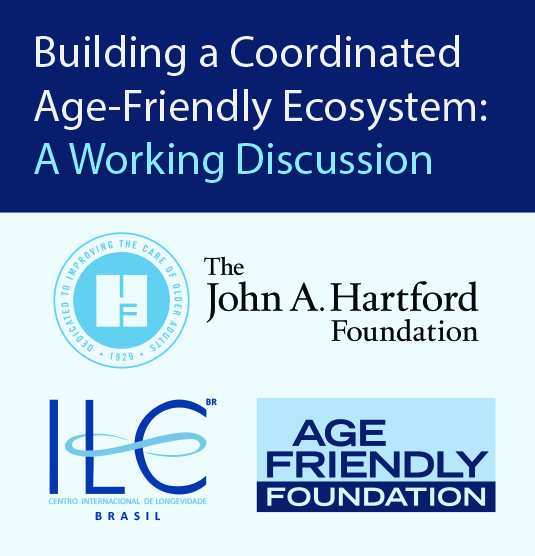On December 16, 2020, 40 recognized leaders who are working to advance age-friendly initiatives in public health, health systems, community, academia and employment gathered in the first of three virtual working sessions sponsored by the Age-Friendly Institute, The John A. Hartford Foundation and the International Longevity Centre: “Building a Coordinated Age-Friendly Ecosystem: A Working Discussion.”
All of our work exists together within an Age-Friendly Ecosystem, comprised of shared characteristics and measures. The goal of this event was to begin discussing those shared characteristics and to introduce measures of collective impact.
We are working together to:
- Make the substance behind the moniker “age-friendly” more clear to all stakeholders
- Enhance the collective impact of the work we are all engaged in, and ultimately to improve quality of life for older adults
- Collaborate on the development of a shared language and potentially, a shared set of harmonized measures
Prior to the convening, the organizers produced a packet of pre-reading that included the following:
- 1. A document (comprised of three tabs) to help analyze our shared characteristics and proposed outcome measures: Please click HERE to access this document
- 2. Moving Toward a Global Age-Friendly Ecosystem: Fulmer, T., Patel, P., Levy, N., Mate, K., Berman, A., Pelton, L., Beard, J., Kalache, A. and Auerbach, J. (2020), J Am Geriatr Soc, 68: 1936-1940. https://doi.org/10.1111/jgs.16675
- 3. Wetle, T.T. (2020), Age‐Friendly Ecosystems: An Aspirational Goal. J Am Geriatr Soc, 68: 1929-1930. https://doi.org/10.1111/jgs.16676
A proposed definition of an Age-Friendly Ecosystem:
An Age-Friendly Ecosystem is a comprehensive, collectively built, ever-expanding platform whose goal is to improve quality of life for older adults around the world through enhanced, collaborative impact. The Age-Friendly Ecosystem does not propose a hierarchy of any particular approach to improving quality of life for older adults. Rather, this platform acknowledges the unique strengths and contributions of existing approaches and promotes enhanced continuity and collective impact across settings.

